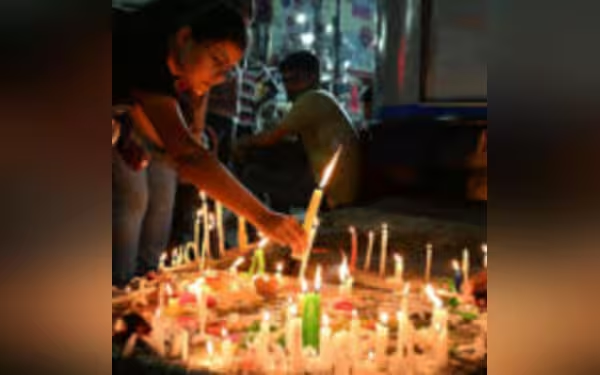Saturday, November 16, 2024 05:44 PM
Kolkata Doctor Murder Sparks Nationwide Protests for Justice
- Nationwide protests demand justice for Kolkata doctor.
- Victim's father questions authorities' urgency in handling case.
- Supreme Court orders task force for healthcare worker security.
 Image Credits: pakistantoday
Image Credits: pakistantodayProtests erupt across India following the rape and murder of a Kolkata doctor, demanding justice and safety for women.
The recent rape and murder of a 31-year-old doctor in Kolkata has ignited a wave of protests across India, highlighting the ongoing issue of violence against women in the country. The doctor’s body was discovered at a state-run hospital on August 9, and since then, the nation has been gripped by outrage and demands for justice. This tragic incident has not only affected the victim's family but has also resonated deeply with countless others who are calling for change.
On Thursday, vast crowds of Indians took to the streets of Kolkata, carrying candles and demanding justice. The sight was both somber and powerful, as protesters chanted, "We want justice!" and held signs that read, "Let there be light, let there be justice." The brutal nature of the crime has sparked a nationwide conversation about the safety of women, with many calling for immediate action to address this chronic issue.
As the protests unfolded, police estimated that around 100,000 people participated in the rally in Kolkata alone. Smaller demonstrations also took place in New Delhi, showcasing the widespread anger and frustration felt across the nation. Protesters, including doctors who have been on strike, formed human chains and lit candles in a poignant display of solidarity. One protester, Rubina Mukherjee, expressed the collective grief, stating, "The heart of the entire nation is torn."
The father of the murdered doctor spoke at the rally, sharing his family's heartbreak and questioning the urgency with which authorities handled the situation. He expressed his anger over the pressure to cremate his daughter’s body quickly, saying, "What was the hurry to cremate her? Mystery shrouds her death." His words reflect the deep sense of loss and confusion that many families experience in the wake of such tragedies.
Despite one man being detained in connection with the murder, the West Bengal government has faced criticism for its handling of the investigation. Many protesters have labeled the murdered doctor as "Abhaya," meaning "fearless," symbolizing the courage and strength of women fighting against violence. The protests have remained largely peaceful, although there have been instances of scuffles between demonstrators and supporters of the ruling party.
India's Supreme Court has taken notice of the situation, ordering a national task force to explore ways to enhance security for healthcare workers. The court described the killing as "horrific" and stated that it has "shocked the conscience of the nation." This incident has drawn comparisons to the infamous 2012 gang rape and murder case in Delhi, which also sparked widespread protests and political action.
As the nation grapples with this tragedy, it is essential to recognize that the fight for justice is not just about one case; it is about creating a safer environment for all women in India. The ongoing protests serve as a reminder that the voices of the people can lead to change. It is crucial for society to come together, support one another, and demand accountability from those in power. Only then can we hope to see a future where women can live without fear of violence.













